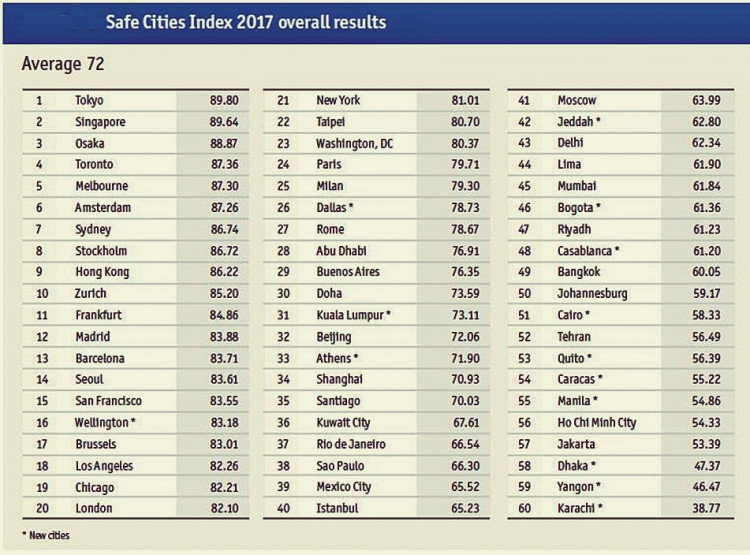The Safe Cities Index 2017 again confirms the paradigm that the world's best cities to live in are in the developed countries while the worst are in developing nations.
No Chinese city was in the 10 worst cities to live in the list in 2017. On the other hand, no mainland Chinese city was in the top 10 best cities to live in, either. Hong Kong, a special administrative region, however, was ninth on the list of the 10 best cities.
Beijing ranked 32nd among the best cities and Shanghai, 34th. In contrast, Taipei was 22nd. The top-ranked American city was San Francisco at 15th followed by Los Angeles 18th and Chicago 19th.
Compiled by the Economist Intelligence Unit (EIU), the Safe Cities Index 2017 ranked world cities as to their personal security, infrastructure security, health security, and digital security. These factors combined to create an overall ranking for each city.
Tokyo, the safest city on the list, had a ranking of 89.90 while Karachi, the 60th and the least safe on the list, scored 38.77. The Safe Cities Index was first released in 2015.
Of the world's safest cities in the 2017 index, six are either in Asia's developed countries or in a special administrative region. The best cities located in Asia are Tokyo (1st); Singapore (2nd); Osaka (3rd); Melbourne (5th); Sydney (7th) and Hong Kong (9th). Three best cities are in Europe: Amsterdam (6th); Stockholm (8th) and Zurich (10th). Only one city is in North America: Toronto (4th).
On the other hand, the most dangerous cities were all located in South and Southeast Asia, the Middle East or Africa. The worst is Karachi (60th and last). Behind Karachi are (from 59th to 51st): Yangon, Dhaka, Jakarta, Ho Chi Minh City, Manila, Caracas, Quito, Tehran, and Cairo.
Tokyo topped the maiden edition of the Safe Cities Index in 2015. This time in 2017, Tokyo was praised for its strong performance is in the digital security category. It also improved seven places in the health security category since 2015. In infrastructure security, however, Tokyo fell from the top 10 to 12th.
Karachi performed poorly across all of four categories. It was dragged down, however, by a very low level of personal security (60th). The main reason for this is that among the cities in the index, Karachi, by far, experiences the most frequent and most severe terrorist attacks compared to the other 59 cities on the list.
EIU said the results of the 2017 Safe Cities Index again show a sharp divide in overall levels of safety between the progressive developing world and the stagnant developed world.
Meanwhile, another major shift noted by the index is the rapid deployment of digital technologies in pursuit of the concept called the "smart city" for want of a better name. The now ubiquitous Internet of Things (IoT) sees sensors collect and wirelessly transmit data. The result is to uncover new insights into city operations while permitting remote and more efficient management of infrastructure and services.






